Unit 1 Where did you go on vacation? Section A 2d-3c 课件(共56张PPT) 2024-2025学年英语人教版八年级上册
文档属性
| 名称 | Unit 1 Where did you go on vacation? Section A 2d-3c 课件(共56张PPT) 2024-2025学年英语人教版八年级上册 | 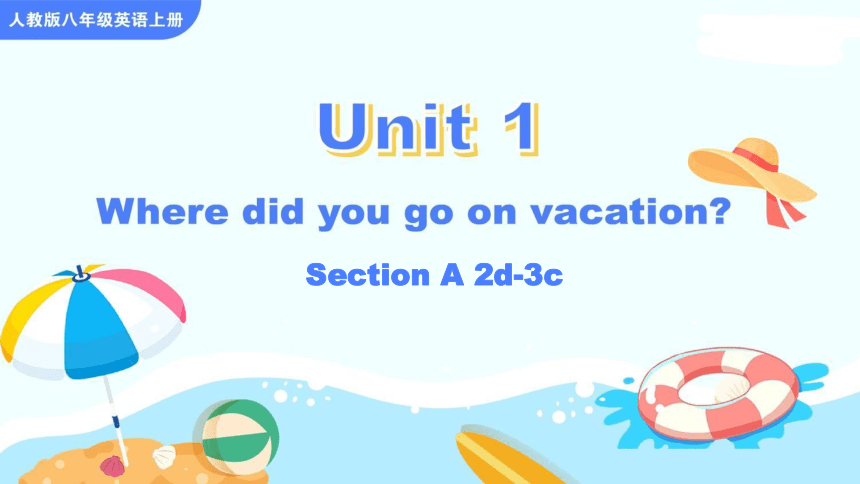 | |
| 格式 | pptx | ||
| 文件大小 | 2.1MB | ||
| 资源类型 | 教案 | ||
| 版本资源 | 人教新目标(Go for it)版 | ||
| 科目 | 英语 | ||
| 更新时间 | 2024-07-02 06:10:00 | ||
图片预览

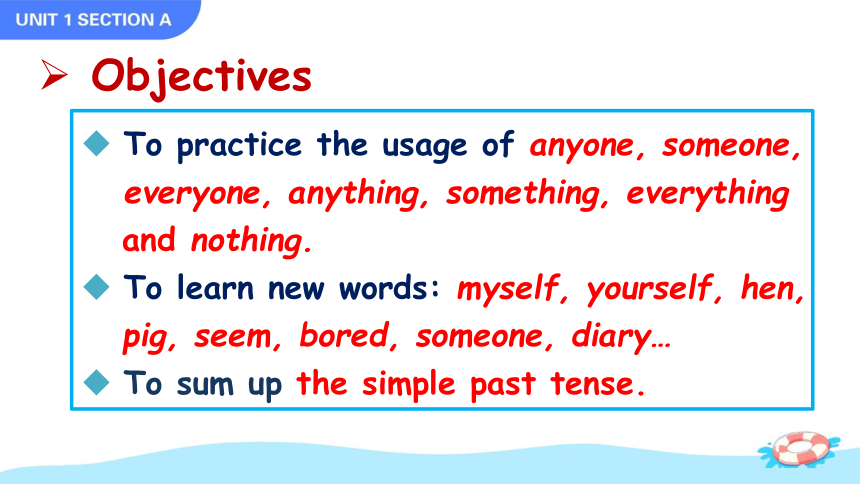
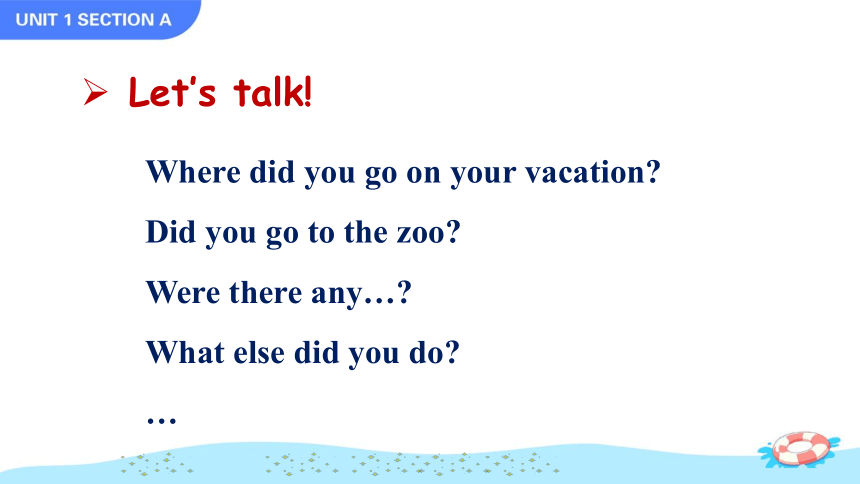
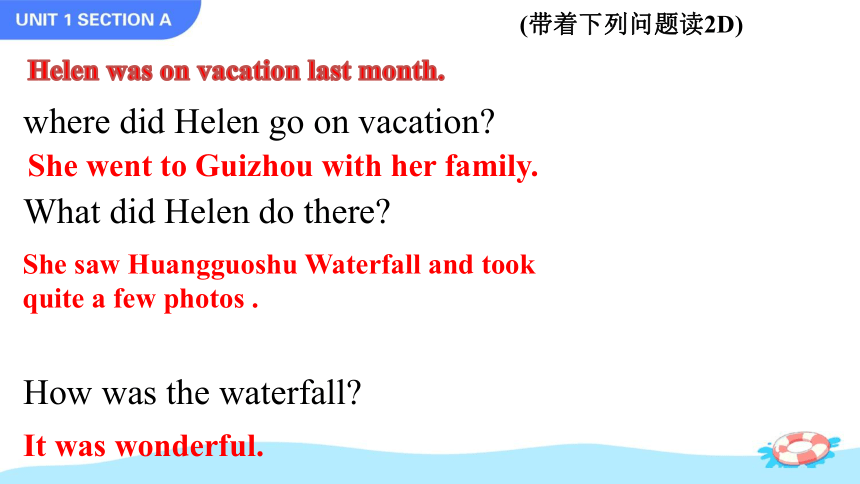
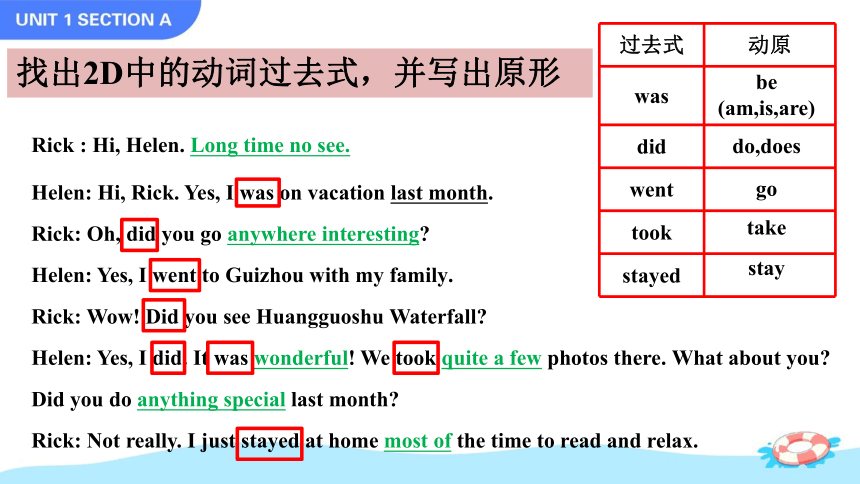
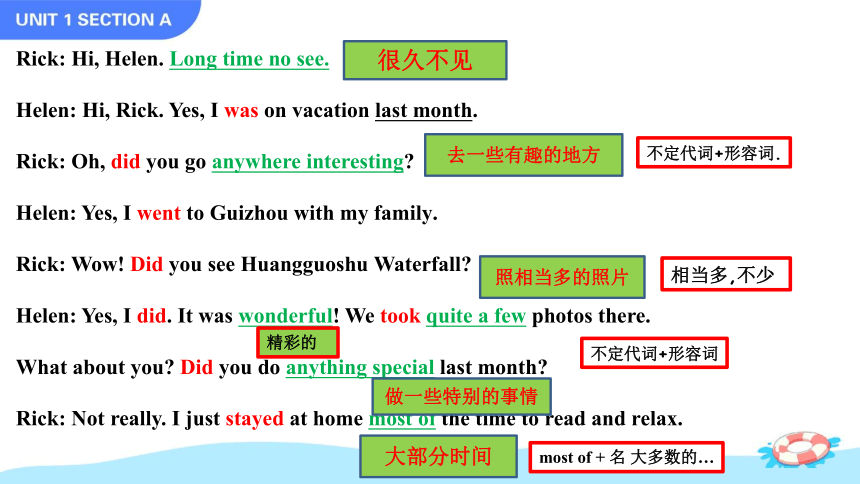
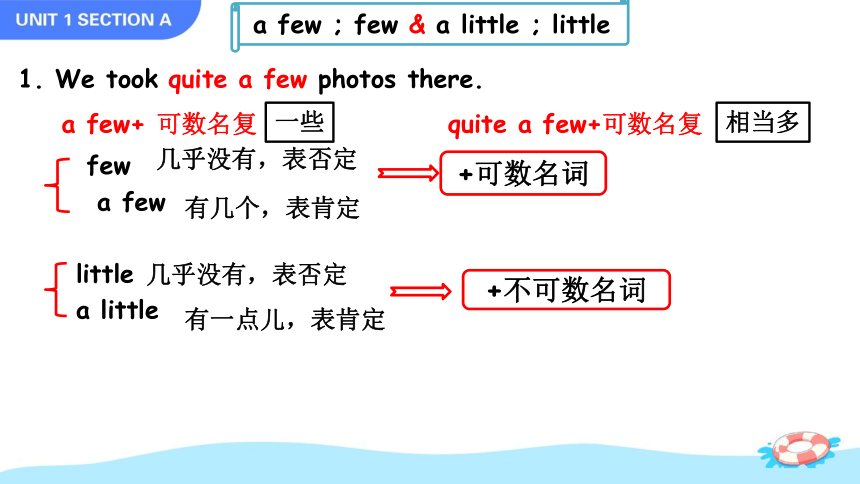
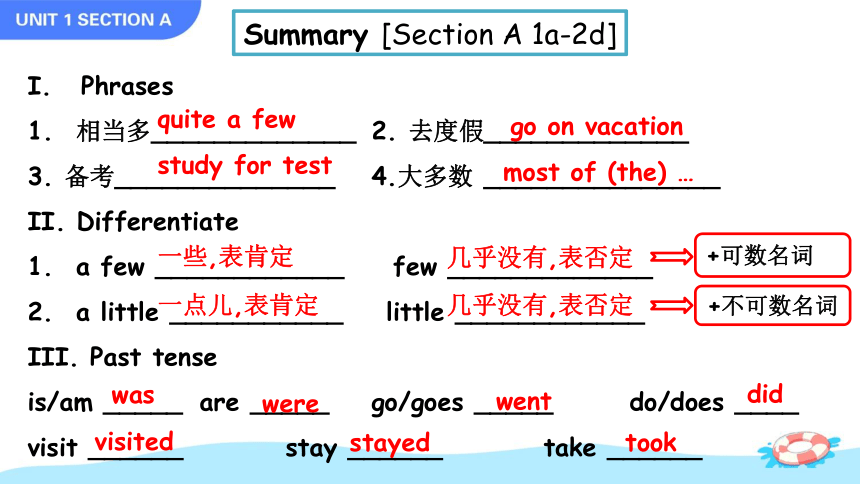
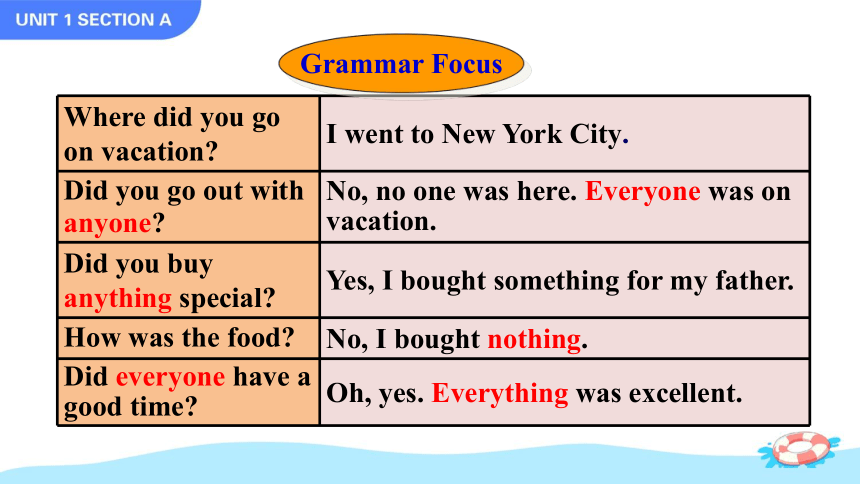
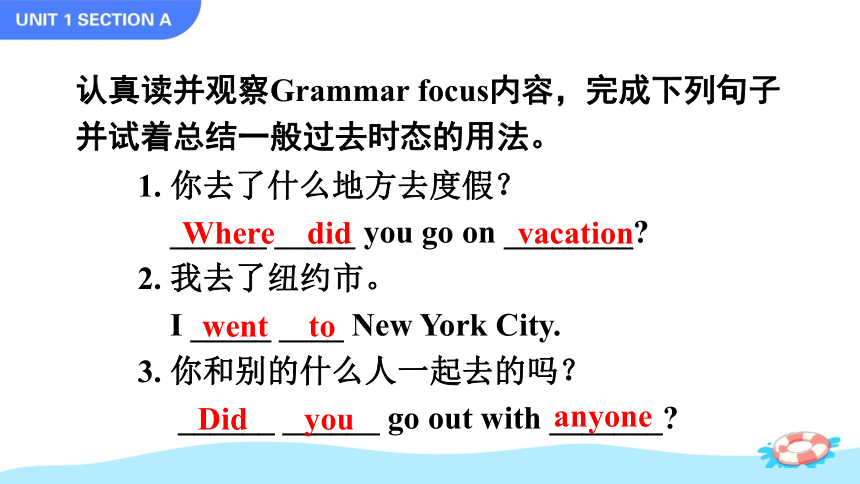
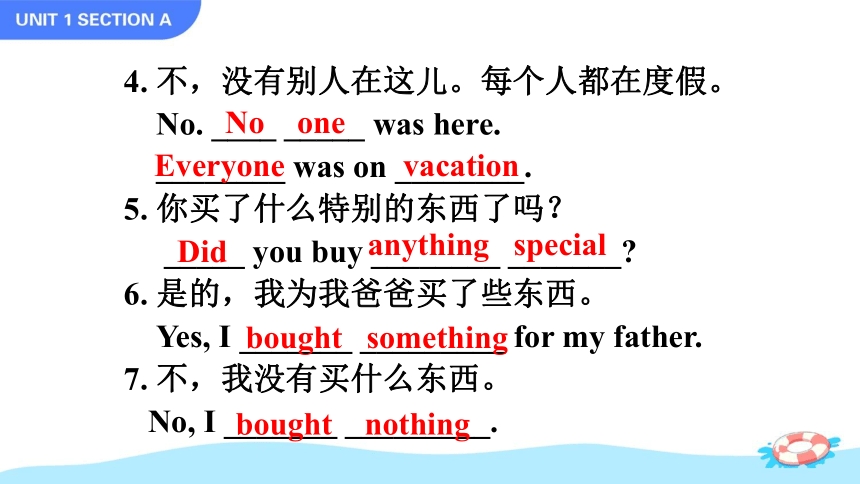
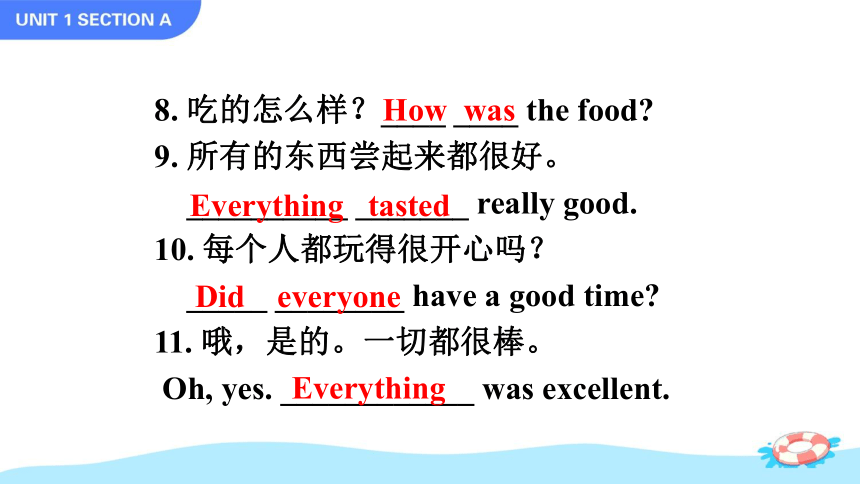
文档简介
(共56张PPT)
Section A 2d-3c
Objectives
To practice the usage of anyone, someone, everyone, anything, something, everything
and nothing.
To learn new words: myself, yourself, hen,
pig, seem, bored, someone, diary…
To sum up the simple past tense.
Where did you go on your vacation
Did you go to the zoo
Were there any…
What else did you do
…
Let’s talk!
Helen was on vacation last month.
where did Helen go on vacation
What did Helen do there
How was the waterfall
(带着下列问题读2D)
She went to Guizhou with her family.
She saw Huangguoshu Waterfall and took
quite a few photos .
It was wonderful.
Rick : Hi, Helen. Long time no see.
Helen: Hi, Rick. Yes, I was on vacation last month.
Rick: Oh, did you go anywhere interesting
Helen: Yes, I went to Guizhou with my family.
Rick: Wow! Did you see Huangguoshu Waterfall
Helen: Yes, I did. It was wonderful! We took quite a few photos there. What about you Did you do anything special last month
Rick: Not really. I just stayed at home most of the time to read and relax.
过去式 动原
was
did
went
took
stayed
be
(am,is,are)
do,does
go
take
stay
找出2D中的动词过去式,并写出原形
Rick: Hi, Helen. Long time no see.
Helen: Hi, Rick. Yes, I was on vacation last month.
Rick: Oh, did you go anywhere interesting
Helen: Yes, I went to Guizhou with my family.
Rick: Wow! Did you see Huangguoshu Waterfall
Helen: Yes, I did. It was wonderful! We took quite a few photos there.
What about you Did you do anything special last month
Rick: Not really. I just stayed at home most of the time to read and relax.
不定代词+形容词.
不定代词+形容词
精彩的
相当多,不少
most of + 名 大多数的…
很久不见
去一些有趣的地方
照相当多的照片
做一些特别的事情
大部分时间
1. We took quite a few photos there.
a few+ 可数名复 quite a few+可数名复
few
a few
little
a little
+可数名词
+不可数名词
a few ; few & a little ; little
一些
相当多
几乎没有,表否定
有几个,表肯定
几乎没有,表否定
有一点儿,表肯定
Summary [Section A 1a-2d]
Phrases
相当多_____________ 2. 去度假_____________
3. 备考______________ 4.大多数 _______________
II. Differentiate
a few ____________ few _____________
a little ___________ little ____________
III. Past tense
is/am _____ are _____ go/goes _____ do/does ____
visit ______ stay ______ take ______
quite a few
go on vacation
study for test
most of (the) …
一些,表肯定
几乎没有,表否定
一点儿,表肯定
几乎没有,表否定
+可数名词
+不可数名词
was
were
went
did
visited
stayed
took
Where did you go on vacation I went to New York City.
Did you go out with anyone No, no one was here. Everyone was on vacation.
Did you buy anything special Yes, I bought something for my father.
How was the food No, I bought nothing.
Did everyone have a good time Oh, yes. Everything was excellent.
Grammar Focus
1. 你去了什么地方去度假?
______ _____ you go on ________
2. 我去了纽约市。
I _____ ____ New York City.
3. 你和别的什么人一起去的吗?
______ ______ go out with _______
vacation
Where did
went to
Did you
anyone
认真读并观察Grammar focus内容,完成下列句子并试着总结一般过去时态的用法。
4. 不,没有别人在这儿。每个人都在度假。
No. ____ _____ was here.
________ was on ________.
5. 你买了什么特别的东西了吗?
_____ you buy ________ _______
6. 是的,我为我爸爸买了些东西。
Yes, I _______ _________ for my father.
7. 不,我没有买什么东西。
No, I _______ _________.
No one
Everyone
vacation
anything special
Did
bought something
bought nothing
8. 吃的怎么样?____ ____ the food
9. 所有的东西尝起来都很好。
__________ _______ really good.
10. 每个人都玩得很开心吗?
_____ ________ have a good time
11. 哦,是的。一切都很棒。
Oh, yes. ____________ was excellent.
How was
Everything tasted
Did everyone
Everything
The simple past tense
一般过去时
1.定义: 1) 表示过去某个时间发生的动作或存在的状态,
常和表示过去的时间状语(如yesterday, last night, in 1990,
two days ago...)连用;
2) 也表示过去经常或反复发生的动作,常和表示频度的
时间状语(如often, always…)连用。
一般过去时
有哪些时间状语可以用来描述过去?
一般过去时常与表示过去的时间状语或从句连用。
a)时间状语
ago(two hours ago(一段时间+ago)
yesterday(句子开头或结尾)
the day before yesterday
last week, last (year, night, month…)
具体时间(如Jan. fourth)
just now
at the age of
one day
long ago
once upon a time(很久以前)
and so on
this morning
long long ago
Sentences
I did my homework yesterday.
I played soccer last Sunday.
I cleaned my room last week.
I went to the beach three years ago.
I played tennis with my friends last weekend.
I went to the movies three days ago.
注:“过去”的概念并不是只指如“yesterday, last week,…”等,实际上“与现在对立的过去”,亦即“非现在的以前”,哪怕是“过了说话时间的几分钟之前”,只要所要表达的时间与说话时的“现在”形成对立,就必须使用一般过去时来表达。在谈到已死去的人的情况时,多用过去时。
e.g. He was here only a few minutes ago.
仅仅几分钟前他还在这里。
I came home just now. 我刚回到家。
I got up very early this morning.
今天早晨我起床很早。
He was late for school again today.
今天他又迟到了。
a)动词变化规则
规则变化:
1. 直接加ed: work— worked look—looked
play—played
2. 以e结尾的单词,直接加d:
live —lived hope—hoped
use——used
3. 以辅音字母+y结尾的,变y为i加ed:
study—— studied carry——carried
worry——worried
4. 以元音字母+y结尾的,直接加ed:
enjoy ——enjoyed play——played
5. 以重读闭音节结尾的,双写最后的辅音字母+ed:
stop—— stopped plan——planned
规则动词过去式词尾-ed的读音
读音规则 读 音 例 词
在浊辅音和元音后面 /d/ moved /mu:vd/
在浊辅音和元音后面 /t/ passed /pa:st/
在清辅音后面 /id/ needed /’ni:did/
am, is—was are—were
go—went do—did
have—had come—came
take—took say—said
eat—ate see—saw
get—got put—put
sleep—slept give—gave
write—wrote read—read
b)动词不规则变化
/red/
buy—bought sit—sat run—ran
swim —swam make—made
feel—felt hear—heard
grow—grew tell—told
know—knew find—found
begin—began bring —brought
stand—stood spend—spent
catch—caught teach—taught
动词不规则变化
基本结构: be动词的过去式
Present Past
am was
is was
are were
单数 复数
I was we were
you were (一個人) you were
(不只一人)
she was
they were
he was it was 肯定句:主语+was (were) +其它.
e.g. I was late yesterday. 昨天我迟到了。
否定句:主语+was (were) +not+其它.
e.g. We weren’t late yesterday. 我们昨天没迟到。
Be 动词的一般过去时态构成:
疑问句:Was (Were) +主语+其它
e.g. Were you ill yesterday 你昨天病了吗?
肯定回答: Yes, I was. 是的,我病了。
否定句: No, I wasn’t. 不,我没病。
特殊疑问句: 特殊疑问词+was (were) +主语+其它
e.g. When were you born 你是什么时候出生的?
A:How your vacation, Lin
B: It pretty good.
A: How the beaches
B: They great.
A: How the weather
B: It hot and wet.
A: How the people
B: They unfriendly.
A:How the stores
B: They expensive.
was
was
were
were
was
was
were
were
were
were
Be— am/is(was)
are(were)
Be 填空
肯定句要使用动词的过去式,否定句和疑问句要使用助动词do和 does 的过去式 did。
肯定句:主语+动词过去式+其它.
e.g. I went home at nine o’clock yesterday.
我昨天九点钟回的家。
否定句:主语+didn’t +动词原形+其它.
e.g. I didn’t go home yesterday. 我昨天没回家。
实义动词的一般过去时态
疑问句:Did +主语+动词原形+其它.
e.g. Did you go home yesterday 你昨天回家了吗?
肯定回答:Yes, I did. 是的,我回了。
否定回答:No, I didn’t. 不,我没回家。
一般过去式的构成形式
肯定式 疑问式 否定式
I worked Did I work I did not work
He /She/It worked Did he /she/it work He /She/It did not work
We worked Did we work We did not work
You worked Did you work You did not work
They worked Did they work They did not work
动词一般过去时,表示过去发生的事;
be用was或用were, have, has变had;
谓语动词过去式,过去时间作标志;
一般动词加-ed,若是特殊得硬记。
否定句很简单,主语之后didn’t添;
疑问句也不难,did放在主语前;
如果谓语之前有did,谓语动词需还原;
动词若是was, were,否定就把not添。
易
记
歌
谣
Last summer, I ______to the beach with my parents.
My vacation _____pretty good . I ____there by bus
_____my bus trip______ relaxing. The beach ______
very beautiful . It _______sunny. I _________ beach
volleyball and ______swimming. The people ______
friendly and the food was ________. I __________my
vacation very much and I _________to go there again.
went
was
went
and
was
was
was
were
delicious
enjoyed
hope
played
went
Write about your vacation and give a report.
某人 某事
任何人 任何事
没有人 没有东西
每人 一切
someone
anyone
no one
everyone
somebody
anybody
nobody
everybody
something
anything
nothing
everything
复合不定代词小结:
1. some, any, no, every与-one, -thing ,-body可以
组成复合不定代词,他们分别是:
2. 复合不定代词用法
(1) some系列的不定代词和some一样主要用于肯
定句;any系列的不定代词和any一样主要用于否
定或疑问句。如:
There is ___________ wrong with my bike.
我的自行车出毛病了。
I can’t see _______in the classroom.
在教室里我没看见任何人。
something
anyone
不过,在表示请求、建议或征求意见的疑问句中
常用some系列的词。
eg. Would you like ___________to drink
你想要一些喝的东西吗?
在表达“任何”这一含义的肯定句中也要用
any系列的词。
eg. I think__________ can do it.
我认为任何人都会做。
anyone
something
(2) 修饰复合不定代词something, anyone等的adj,adv,to do不定式等要放在不定代词的后面。如:
Did you meet __________________
你遇见有趣的人了吗?
I have ________ to do today.
我今天没什么事可做。
There’s __________________ in the newspaper today.
今天的报纸里有一些重要的内容。
anyone interesting
nothing
something important
(4) no 系列的不定代词可与not...any 系列
的不定代词替换。
eg. I bought nothing.= I______buy ___________.
我什么也没买。
didn't
anything
(3)这些不定代词作主语时看作单数,谓语动词用
单数形式。
eg. Everyone ______ on vacation last weekends.
上周末所有的人都在度假。
was
Linda: Did you do___________ fun on your vacation,
Alice
Alice: Yes, I did. I went to Sanya.
Linda: How did you like it
Alice: Well, it was my first time there, so___________
was really interesting.
Fill in the blanks with the words in the box and practice the conversation.
anything
everything
3a
anyone something anything everything nothing
Linda: Did you go with__________
Alice: Yes, I did. I went with my sister.
Linda: Did you go shopping
Alice: Of course! I bought__________ for my parents, but _________for myself.
Linda: Why didn’t you buy__________ for yourself
Alice: I didn’t really see ____________I liked.
anyone
something
nothing
anything
anything
Dear Bill,
How was your vacation Did you do ________ interesting Did________ in the family go with you I went to a friend’s farm in the countryside with my family. __________was great.
anything everything nothing everyone no one
Fill in the blanks in the e-mail message with the words in the box.
anything
everyone
Everything
3b
We fed some hens and saw some baby pigs. They were so cute! The only problem was that there was __________ much to do in the evening but read. Still __________ seemed to be bored. Bye for now!
Mark
nothing
no one
Did you… Everyone Someone(write the classmates’ name ) No one
eat anything at a restaurant
read anything interesting
visit anyone in your family
buy anything
keep a diary
Ask your group questions about their last
vacation. Then tell the class your results.
In our group, everyone ate something at a restaurant...
3c
2.anyone, someone, everyone, no one, anything,
something, everything , nothing 等复合不定代词
的用法。
Summary
1.一般过去时态的构成、用法,
动词过去式的构成规则。
1.get — 2.say —
3.have — 4.be—
5.tell — 6.think —
7.write — 8.drive —
9.run — 10.read —
I. 写出下列单词的过去式。
got
said
had
was, were
told
thought
wrote
drove
ran
read
Exercises
11. see— 12. stand —
13. put — 14. eat —
15. buy — 16. drink —
17. sleep — e —
19. play — 20. study —
21. listen —
saw
stood
put
ate
bought
drank
slept
came
played
studied
listened
II. 用所给动词的适当形式填空。
We ______ (live) in Japan last year.
Jack________ (stop) the car last Sunday.
Tom _______ (clean) his room and ________ (study) for the Chinese test last weekend.
4.What ______ you ______(do) last night
5.On Sunday morning I _______ (play) tennis.
lived
stopped
cleaned
studied
did
do
played
III. 句型转换。
Lucy did her homework at home. (改否定句)
2. He found some meat in the fridge(冰箱).
(变一般疑问句)
3. She stayed there for a week.(画线部分提问)
Lucy didn’t do her homework at home.
Did he find any meat in the fridge
How long did she stay there
4. She went to the beach last Sunday.
(变一般疑问句)
5.They stayed at home on vacation.(就画线部分提问)
Did she go to the beach last Sunday
Where did they stay on vacation
6. The weather was hot and humid. (变否定句)
7. Nancy went to the cinema last night. (改为同义句)
8. The people in New York were friendly.
(就画线部分提问)
The weather wasn’t hot or humid.
Nancy went to see a film last night.
How were the people in New York
Ⅳ.汉译英。
1. 最近每个人都很忙。
2.— 你假期做什么有趣的事了吗?
— 是的。 我去北京了。
Everyone is very busy these days.
—Did you do anything fun on your vacation
—Yes, I did. I went to Beijing.
3. 你假期过得怎么样?
How was your vacation
4. 晚上没有什么事可做,只好看书。
There was nothing much to do in the evening
but reading.
5. 我给我父母买了一些礼物,却没给自己买。
I bought some gifts for my parents, but nothing
for myself.
中考链接
Learning is a lifelong journey because we can learn _______ every day.
A. nothing new
B. new something
C. something new
“每天学习新的东西”,肯定句用something,修饰语放在不定代词后面。
C
Almost ______ in our group has been to the 2nd Digital China Summit. It’s fantastic.
A. someone B. everyone C. anyone
“我们组几乎每个人都去过第二届数字中国建筑峰会”,肯定句用everyone。
B
Homework
1. Write about your vacation in your
exercise book.
2. Preview the next part.
Thank you!
Section A 2d-3c
Objectives
To practice the usage of anyone, someone, everyone, anything, something, everything
and nothing.
To learn new words: myself, yourself, hen,
pig, seem, bored, someone, diary…
To sum up the simple past tense.
Where did you go on your vacation
Did you go to the zoo
Were there any…
What else did you do
…
Let’s talk!
Helen was on vacation last month.
where did Helen go on vacation
What did Helen do there
How was the waterfall
(带着下列问题读2D)
She went to Guizhou with her family.
She saw Huangguoshu Waterfall and took
quite a few photos .
It was wonderful.
Rick : Hi, Helen. Long time no see.
Helen: Hi, Rick. Yes, I was on vacation last month.
Rick: Oh, did you go anywhere interesting
Helen: Yes, I went to Guizhou with my family.
Rick: Wow! Did you see Huangguoshu Waterfall
Helen: Yes, I did. It was wonderful! We took quite a few photos there. What about you Did you do anything special last month
Rick: Not really. I just stayed at home most of the time to read and relax.
过去式 动原
was
did
went
took
stayed
be
(am,is,are)
do,does
go
take
stay
找出2D中的动词过去式,并写出原形
Rick: Hi, Helen. Long time no see.
Helen: Hi, Rick. Yes, I was on vacation last month.
Rick: Oh, did you go anywhere interesting
Helen: Yes, I went to Guizhou with my family.
Rick: Wow! Did you see Huangguoshu Waterfall
Helen: Yes, I did. It was wonderful! We took quite a few photos there.
What about you Did you do anything special last month
Rick: Not really. I just stayed at home most of the time to read and relax.
不定代词+形容词.
不定代词+形容词
精彩的
相当多,不少
most of + 名 大多数的…
很久不见
去一些有趣的地方
照相当多的照片
做一些特别的事情
大部分时间
1. We took quite a few photos there.
a few+ 可数名复 quite a few+可数名复
few
a few
little
a little
+可数名词
+不可数名词
a few ; few & a little ; little
一些
相当多
几乎没有,表否定
有几个,表肯定
几乎没有,表否定
有一点儿,表肯定
Summary [Section A 1a-2d]
Phrases
相当多_____________ 2. 去度假_____________
3. 备考______________ 4.大多数 _______________
II. Differentiate
a few ____________ few _____________
a little ___________ little ____________
III. Past tense
is/am _____ are _____ go/goes _____ do/does ____
visit ______ stay ______ take ______
quite a few
go on vacation
study for test
most of (the) …
一些,表肯定
几乎没有,表否定
一点儿,表肯定
几乎没有,表否定
+可数名词
+不可数名词
was
were
went
did
visited
stayed
took
Where did you go on vacation I went to New York City.
Did you go out with anyone No, no one was here. Everyone was on vacation.
Did you buy anything special Yes, I bought something for my father.
How was the food No, I bought nothing.
Did everyone have a good time Oh, yes. Everything was excellent.
Grammar Focus
1. 你去了什么地方去度假?
______ _____ you go on ________
2. 我去了纽约市。
I _____ ____ New York City.
3. 你和别的什么人一起去的吗?
______ ______ go out with _______
vacation
Where did
went to
Did you
anyone
认真读并观察Grammar focus内容,完成下列句子并试着总结一般过去时态的用法。
4. 不,没有别人在这儿。每个人都在度假。
No. ____ _____ was here.
________ was on ________.
5. 你买了什么特别的东西了吗?
_____ you buy ________ _______
6. 是的,我为我爸爸买了些东西。
Yes, I _______ _________ for my father.
7. 不,我没有买什么东西。
No, I _______ _________.
No one
Everyone
vacation
anything special
Did
bought something
bought nothing
8. 吃的怎么样?____ ____ the food
9. 所有的东西尝起来都很好。
__________ _______ really good.
10. 每个人都玩得很开心吗?
_____ ________ have a good time
11. 哦,是的。一切都很棒。
Oh, yes. ____________ was excellent.
How was
Everything tasted
Did everyone
Everything
The simple past tense
一般过去时
1.定义: 1) 表示过去某个时间发生的动作或存在的状态,
常和表示过去的时间状语(如yesterday, last night, in 1990,
two days ago...)连用;
2) 也表示过去经常或反复发生的动作,常和表示频度的
时间状语(如often, always…)连用。
一般过去时
有哪些时间状语可以用来描述过去?
一般过去时常与表示过去的时间状语或从句连用。
a)时间状语
ago(two hours ago(一段时间+ago)
yesterday(句子开头或结尾)
the day before yesterday
last week, last (year, night, month…)
具体时间(如Jan. fourth)
just now
at the age of
one day
long ago
once upon a time(很久以前)
and so on
this morning
long long ago
Sentences
I did my homework yesterday.
I played soccer last Sunday.
I cleaned my room last week.
I went to the beach three years ago.
I played tennis with my friends last weekend.
I went to the movies three days ago.
注:“过去”的概念并不是只指如“yesterday, last week,…”等,实际上“与现在对立的过去”,亦即“非现在的以前”,哪怕是“过了说话时间的几分钟之前”,只要所要表达的时间与说话时的“现在”形成对立,就必须使用一般过去时来表达。在谈到已死去的人的情况时,多用过去时。
e.g. He was here only a few minutes ago.
仅仅几分钟前他还在这里。
I came home just now. 我刚回到家。
I got up very early this morning.
今天早晨我起床很早。
He was late for school again today.
今天他又迟到了。
a)动词变化规则
规则变化:
1. 直接加ed: work— worked look—looked
play—played
2. 以e结尾的单词,直接加d:
live —lived hope—hoped
use——used
3. 以辅音字母+y结尾的,变y为i加ed:
study—— studied carry——carried
worry——worried
4. 以元音字母+y结尾的,直接加ed:
enjoy ——enjoyed play——played
5. 以重读闭音节结尾的,双写最后的辅音字母+ed:
stop—— stopped plan——planned
规则动词过去式词尾-ed的读音
读音规则 读 音 例 词
在浊辅音和元音后面 /d/ moved /mu:vd/
在浊辅音和元音后面 /t/ passed /pa:st/
在清辅音后面 /id/ needed /’ni:did/
am, is—was are—were
go—went do—did
have—had come—came
take—took say—said
eat—ate see—saw
get—got put—put
sleep—slept give—gave
write—wrote read—read
b)动词不规则变化
/red/
buy—bought sit—sat run—ran
swim —swam make—made
feel—felt hear—heard
grow—grew tell—told
know—knew find—found
begin—began bring —brought
stand—stood spend—spent
catch—caught teach—taught
动词不规则变化
基本结构: be动词的过去式
Present Past
am was
is was
are were
单数 复数
I was we were
you were (一個人) you were
(不只一人)
she was
they were
he was it was 肯定句:主语+was (were) +其它.
e.g. I was late yesterday. 昨天我迟到了。
否定句:主语+was (were) +not+其它.
e.g. We weren’t late yesterday. 我们昨天没迟到。
Be 动词的一般过去时态构成:
疑问句:Was (Were) +主语+其它
e.g. Were you ill yesterday 你昨天病了吗?
肯定回答: Yes, I was. 是的,我病了。
否定句: No, I wasn’t. 不,我没病。
特殊疑问句: 特殊疑问词+was (were) +主语+其它
e.g. When were you born 你是什么时候出生的?
A:How your vacation, Lin
B: It pretty good.
A: How the beaches
B: They great.
A: How the weather
B: It hot and wet.
A: How the people
B: They unfriendly.
A:How the stores
B: They expensive.
was
was
were
were
was
was
were
were
were
were
Be— am/is(was)
are(were)
Be 填空
肯定句要使用动词的过去式,否定句和疑问句要使用助动词do和 does 的过去式 did。
肯定句:主语+动词过去式+其它.
e.g. I went home at nine o’clock yesterday.
我昨天九点钟回的家。
否定句:主语+didn’t +动词原形+其它.
e.g. I didn’t go home yesterday. 我昨天没回家。
实义动词的一般过去时态
疑问句:Did +主语+动词原形+其它.
e.g. Did you go home yesterday 你昨天回家了吗?
肯定回答:Yes, I did. 是的,我回了。
否定回答:No, I didn’t. 不,我没回家。
一般过去式的构成形式
肯定式 疑问式 否定式
I worked Did I work I did not work
He /She/It worked Did he /she/it work He /She/It did not work
We worked Did we work We did not work
You worked Did you work You did not work
They worked Did they work They did not work
动词一般过去时,表示过去发生的事;
be用was或用were, have, has变had;
谓语动词过去式,过去时间作标志;
一般动词加-ed,若是特殊得硬记。
否定句很简单,主语之后didn’t添;
疑问句也不难,did放在主语前;
如果谓语之前有did,谓语动词需还原;
动词若是was, were,否定就把not添。
易
记
歌
谣
Last summer, I ______to the beach with my parents.
My vacation _____pretty good . I ____there by bus
_____my bus trip______ relaxing. The beach ______
very beautiful . It _______sunny. I _________ beach
volleyball and ______swimming. The people ______
friendly and the food was ________. I __________my
vacation very much and I _________to go there again.
went
was
went
and
was
was
was
were
delicious
enjoyed
hope
played
went
Write about your vacation and give a report.
某人 某事
任何人 任何事
没有人 没有东西
每人 一切
someone
anyone
no one
everyone
somebody
anybody
nobody
everybody
something
anything
nothing
everything
复合不定代词小结:
1. some, any, no, every与-one, -thing ,-body可以
组成复合不定代词,他们分别是:
2. 复合不定代词用法
(1) some系列的不定代词和some一样主要用于肯
定句;any系列的不定代词和any一样主要用于否
定或疑问句。如:
There is ___________ wrong with my bike.
我的自行车出毛病了。
I can’t see _______in the classroom.
在教室里我没看见任何人。
something
anyone
不过,在表示请求、建议或征求意见的疑问句中
常用some系列的词。
eg. Would you like ___________to drink
你想要一些喝的东西吗?
在表达“任何”这一含义的肯定句中也要用
any系列的词。
eg. I think__________ can do it.
我认为任何人都会做。
anyone
something
(2) 修饰复合不定代词something, anyone等的adj,adv,to do不定式等要放在不定代词的后面。如:
Did you meet __________________
你遇见有趣的人了吗?
I have ________ to do today.
我今天没什么事可做。
There’s __________________ in the newspaper today.
今天的报纸里有一些重要的内容。
anyone interesting
nothing
something important
(4) no 系列的不定代词可与not...any 系列
的不定代词替换。
eg. I bought nothing.= I______buy ___________.
我什么也没买。
didn't
anything
(3)这些不定代词作主语时看作单数,谓语动词用
单数形式。
eg. Everyone ______ on vacation last weekends.
上周末所有的人都在度假。
was
Linda: Did you do___________ fun on your vacation,
Alice
Alice: Yes, I did. I went to Sanya.
Linda: How did you like it
Alice: Well, it was my first time there, so___________
was really interesting.
Fill in the blanks with the words in the box and practice the conversation.
anything
everything
3a
anyone something anything everything nothing
Linda: Did you go with__________
Alice: Yes, I did. I went with my sister.
Linda: Did you go shopping
Alice: Of course! I bought__________ for my parents, but _________for myself.
Linda: Why didn’t you buy__________ for yourself
Alice: I didn’t really see ____________I liked.
anyone
something
nothing
anything
anything
Dear Bill,
How was your vacation Did you do ________ interesting Did________ in the family go with you I went to a friend’s farm in the countryside with my family. __________was great.
anything everything nothing everyone no one
Fill in the blanks in the e-mail message with the words in the box.
anything
everyone
Everything
3b
We fed some hens and saw some baby pigs. They were so cute! The only problem was that there was __________ much to do in the evening but read. Still __________ seemed to be bored. Bye for now!
Mark
nothing
no one
Did you… Everyone Someone(write the classmates’ name ) No one
eat anything at a restaurant
read anything interesting
visit anyone in your family
buy anything
keep a diary
Ask your group questions about their last
vacation. Then tell the class your results.
In our group, everyone ate something at a restaurant...
3c
2.anyone, someone, everyone, no one, anything,
something, everything , nothing 等复合不定代词
的用法。
Summary
1.一般过去时态的构成、用法,
动词过去式的构成规则。
1.get — 2.say —
3.have — 4.be—
5.tell — 6.think —
7.write — 8.drive —
9.run — 10.read —
I. 写出下列单词的过去式。
got
said
had
was, were
told
thought
wrote
drove
ran
read
Exercises
11. see— 12. stand —
13. put — 14. eat —
15. buy — 16. drink —
17. sleep — e —
19. play — 20. study —
21. listen —
saw
stood
put
ate
bought
drank
slept
came
played
studied
listened
II. 用所给动词的适当形式填空。
We ______ (live) in Japan last year.
Jack________ (stop) the car last Sunday.
Tom _______ (clean) his room and ________ (study) for the Chinese test last weekend.
4.What ______ you ______(do) last night
5.On Sunday morning I _______ (play) tennis.
lived
stopped
cleaned
studied
did
do
played
III. 句型转换。
Lucy did her homework at home. (改否定句)
2. He found some meat in the fridge(冰箱).
(变一般疑问句)
3. She stayed there for a week.(画线部分提问)
Lucy didn’t do her homework at home.
Did he find any meat in the fridge
How long did she stay there
4. She went to the beach last Sunday.
(变一般疑问句)
5.They stayed at home on vacation.(就画线部分提问)
Did she go to the beach last Sunday
Where did they stay on vacation
6. The weather was hot and humid. (变否定句)
7. Nancy went to the cinema last night. (改为同义句)
8. The people in New York were friendly.
(就画线部分提问)
The weather wasn’t hot or humid.
Nancy went to see a film last night.
How were the people in New York
Ⅳ.汉译英。
1. 最近每个人都很忙。
2.— 你假期做什么有趣的事了吗?
— 是的。 我去北京了。
Everyone is very busy these days.
—Did you do anything fun on your vacation
—Yes, I did. I went to Beijing.
3. 你假期过得怎么样?
How was your vacation
4. 晚上没有什么事可做,只好看书。
There was nothing much to do in the evening
but reading.
5. 我给我父母买了一些礼物,却没给自己买。
I bought some gifts for my parents, but nothing
for myself.
中考链接
Learning is a lifelong journey because we can learn _______ every day.
A. nothing new
B. new something
C. something new
“每天学习新的东西”,肯定句用something,修饰语放在不定代词后面。
C
Almost ______ in our group has been to the 2nd Digital China Summit. It’s fantastic.
A. someone B. everyone C. anyone
“我们组几乎每个人都去过第二届数字中国建筑峰会”,肯定句用everyone。
B
Homework
1. Write about your vacation in your
exercise book.
2. Preview the next part.
Thank you!
同课章节目录
- Unit 1 Where did you go on vacation?
- Section A
- Section B
- Unit 2 How often do you exercise?
- Section A
- Section B
- Unit 3 I'm more outgoing than my sister.
- Section A
- Section B
- Unit 4 What's the best movie theater?
- Section A
- Section B
- Unit 5 Do you want to watch a game show?
- Section A
- Section B
- Unit 6 I'm going to study computer science.
- Section A
- Section B
- Unit 7 Will people have robots?
- Section A
- Section B
- Unit 8 How do you make a banana milk shake?
- Section A
- Section B
- Unit 9 Can you come to my party?
- Section A
- Section B
- Unit 10 If you go to the party, you'll have a grea
- Section A
- Section B
